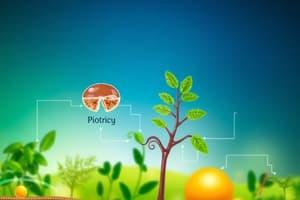Podcast
Questions and Answers
What is the primary function of life processes in living organisms?
What is the primary function of life processes in living organisms?
- To facilitate growth and development
- To convert energy from one form to another
- To regulate environmental factors
- To prevent damage and breakdown (correct)
What is the primary source of energy for life processes in living organisms?
What is the primary source of energy for life processes in living organisms?
- Energy from the environment
- Energy generated through cellular movements
- External energy sources, such as food (correct)
- Internal energy reserves
What is the primary purpose of nutrition in living organisms?
What is the primary purpose of nutrition in living organisms?
- To provide energy for growth and development
- To repair damaged tissues and organs
- To regulate the body's internal environment
- To transfer energy from outside the body to the inside (correct)
What is the primary component of most food sources used by living organisms?
What is the primary component of most food sources used by living organisms?
What is the primary purpose of oxidising-reducing reactions in living organisms?
What is the primary purpose of oxidising-reducing reactions in living organisms?
What is the primary source of oxygen used in respiration?
What is the primary source of oxygen used in respiration?
What is the primary purpose of respiration in living organisms?
What is the primary purpose of respiration in living organisms?
What is the primary result of the breakdown of food sources in living organisms?
What is the primary result of the breakdown of food sources in living organisms?
Why do single-celled organisms not require specific organs for taking in food, exchanging gases, or removing wastes?
Why do single-celled organisms not require specific organs for taking in food, exchanging gases, or removing wastes?
What is the primary reason for the development of a transportation system in multi-cellular organisms?
What is the primary reason for the development of a transportation system in multi-cellular organisms?
What is the outcome of chemical reactions that use carbon sources and oxygen for energy generation?
What is the outcome of chemical reactions that use carbon sources and oxygen for energy generation?
What is the purpose of the excretory tissue in multi-cellular organisms?
What is the purpose of the excretory tissue in multi-cellular organisms?
Why do all the cells in a multi-cellular organism not receive food and oxygen directly from the environment?
Why do all the cells in a multi-cellular organism not receive food and oxygen directly from the environment?
What is the function of specialized tissues in multi-cellular organisms?
What is the function of specialized tissues in multi-cellular organisms?
Why does the transportation system in multi-cellular organisms need to transport waste away from cells?
Why does the transportation system in multi-cellular organisms need to transport waste away from cells?
What is the common feature of single-celled and multi-cellular organisms in terms of their body design?
What is the common feature of single-celled and multi-cellular organisms in terms of their body design?
Flashcards are hidden until you start studying
Study Notes
Life Processes
- Life processes are necessary to maintain an organism's health and prevent damage and break-down.
- These processes require energy, which is obtained from outside the body through food (nutrition).
Nutrition
- Nutrition is the process of transferring energy from outside the body to the inside.
- Food sources are typically carbon-based, and the complexity of these sources determines the type of nutritional process used.
- The body requires additional raw material from outside to grow in size.
Energy Sources
- Outside sources of energy can be varied, and need to be broken down or built up in the body to be used.
- These energy sources are converted to a uniform source of energy for molecular movements and growth.
Chemical Reactions
- A series of chemical reactions in the body are necessary to break down molecules.
- Oxidising-reducing reactions are commonly used to break down molecules, often using oxygen sourced from outside the body.
Respiration
- Respiration is the process of acquiring oxygen from outside the body and using it to break down food sources for cellular needs.
Multi-Cellular Organisms
- In multi-cellular organisms, not all cells are in direct contact with the environment.
- Simple diffusion is not sufficient to meet the needs of all cells, leading to the development of specialized tissues.
Transportation System
- The uptake of food and oxygen is carried out by specialized tissues, creating a need for a transportation system to carry these substances to all parts of the body.
- The transportation system also needs to carry waste away from cells to excretory tissues.
Excretion
- Excretion is the process of removing waste by-products from the body, which are created during chemical reactions that generate energy.
- A specialized tissue for excretion is developed in multi-cellular organisms, and the transportation system plays a role in removing waste from cells to this tissue.
Studying That Suits You
Use AI to generate personalized quizzes and flashcards to suit your learning preferences.




